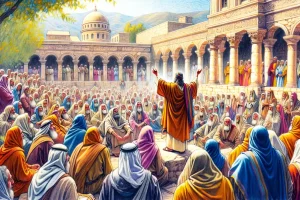
The Book of 2 Timothy
The Second Epistle to Timothy, commonly known as 2 Timothy, is one of the pastoral letters attributed to the Apostle Paul. It is addressed to Timothy, a close companion and disciple of Paul, and is believed to be one of Paul’s final letters before his martyrdom. 2 Timothy serves as a personal letter from Paul to Timothy, offering encouragement, exhortation, and instructions for ministry in the face of adversity and opposition. The letter reflects Paul’s deep affection for Timothy and his concern for the future of the church. Themes of perseverance in faith, endurance through suffering, the preservation of sound doctrine, and the passing of the mantle of leadership permeate the letter, making it a poignant and powerful testament to Paul’s enduring legacy and Timothy’s role in continuing the work of ministry.
- Authorship and Date:
- Recipient and Context:
- Addressed to Timothy, Paul’s beloved co-worker and fellow minister in the gospel.
- The letter is written during a time of personal hardship for Paul, as he anticipates his impending death and reflects on his ministry.
- Themes:
- Perseverance and Endurance: Paul encourages Timothy to remain steadfast in his faith and to endure suffering and hardship for the sake of the gospel. He uses his own life as an example of enduring faith despite persecution.
- Preservation of Sound Doctrine: Paul emphasizes the importance of holding fast to sound teaching and guarding the deposit of faith entrusted to Timothy. He warns against false teachings and urges Timothy to preach the word with conviction.
- Faithfulness in Ministry: Paul urges Timothy to fulfill his ministry with courage, diligence, and faithfulness, despite opposition and challenges. He reminds Timothy of his spiritual gifts and calls him to fan into flame the gift of God.
- Passing the Torch: Paul reflects on his own ministry and legacy, urging Timothy to continue in the faith and to entrust the gospel to faithful men who will carry it forward. He speaks of his own imminent death and expresses confidence in the future of the gospel.
- Structure:
- Salutation and Thanksgiving (1:1-7): Paul greets Timothy with affection and gratitude, reminding him of his sincere faith and the spiritual gifts he has received.
- Exhortations to Courage and Endurance (1:8-2:13): Paul encourages Timothy to stand firm in the face of suffering, reminding him of the power of God and the example of faithful witnesses. He exhorts Timothy to be a good soldier of Christ, avoiding distractions and focusing on the gospel.
- Instructions for Ministry (2:14-4:8): Paul provides practical guidance for Timothy’s ministry, including warnings against false teaching, instructions for handling conflicts, and reminders of the importance of preaching the word. He charges Timothy to do the work of an evangelist and to fulfill his ministry faithfully.
- Final Greetings and Benediction (4:9-22): Paul concludes with personal greetings, requests, and blessings for Timothy and others who have supported him in ministry. He reflects on his own life and ministry, expressing confidence in God’s faithfulness.
- Key Verses:
- 2 Timothy 1:7: “For God gave us a spirit not of fear but of power and love and self-control.”
- 2 Timothy 2:15: “Do your best to present yourself to God as one approved, a worker who has no need to be ashamed, rightly handling the word of truth.”
- 2 Timothy 4:7-8: “I have fought the good fight, I have finished the race, I have kept the faith.”
- Significance:
- 2 Timothy serves as a profound and personal reflection on Paul’s ministry and legacy, offering timeless wisdom and encouragement for all who are called to serve in the gospel.
- The letter provides invaluable insights into the challenges and responsibilities of Christian leadership, emphasizing the importance of faithfulness, perseverance, and sound doctrine in the face of adversity.
- 2 Timothy stands as a fitting conclusion to Paul’s pastoral epistles, highlighting his enduring commitment to the gospel and his confidence in God’s faithfulness, even in the midst of trials and persecution.



